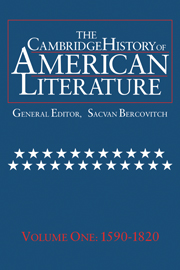Book contents
- Frontmatter
- Introduction
- THE LITERATURE OF COLONIZATION
- NEW ENGLAND PURITAN LITERATURE
- 1 The Language of Salem Witchcraft
- 2 The Dream of a Christian Utopia
- 3 Personal Narrative and History
- 4 Poetry
- 5 The Jeremiad
- 6 Reason and Revivalism
- BRITISH-AMERICAN BELLES LETTRES
- THE AMERICAN ENLIGHTENMENT, 1750–1820
- THE LITERATURE OF THE REVOLUTIONARY AND EARLY NATIONAL PERIODS
- Chronology
- Bibliography
- Index
3 - Personal Narrative and History
from NEW ENGLAND PURITAN LITERATURE
Published online by Cambridge University Press: 28 March 2008
- Frontmatter
- Introduction
- THE LITERATURE OF COLONIZATION
- NEW ENGLAND PURITAN LITERATURE
- 1 The Language of Salem Witchcraft
- 2 The Dream of a Christian Utopia
- 3 Personal Narrative and History
- 4 Poetry
- 5 The Jeremiad
- 6 Reason and Revivalism
- BRITISH-AMERICAN BELLES LETTRES
- THE AMERICAN ENLIGHTENMENT, 1750–1820
- THE LITERATURE OF THE REVOLUTIONARY AND EARLY NATIONAL PERIODS
- Chronology
- Bibliography
- Index
Summary
As many historians admit, a record of past events is the hybrid product of facts and interpretation. The Puritans, convinced of the flawed and fallen nature of humanity, distrusted all accounts of the past except those of the Bible. At the same time, they produced a host of personal narratives of individual lives and histories of the corporate New England enterprise because they believed that, even in its corrupted state, human reason is one of God's primary vehicles for communicating His lessons to humanity. A record of God's dealings with His people could be spiritually beneficial. Funeral sermons rehearsed the lives of deceased saints, and election sermons recounted the spiritual record of the community. Biographies, autobiographies, diaries, and conversion narratives recorded the saint's fulfillment of a single destiny, but histories charted the progress of God's larger design.
Although the specific focus of a particular text might be on the one or the many, Puritan authors and audiences believed that the lives of the individual and. of the group were inseparable. The church represented the body of Christ, with every member such an integral part that if one person were in distress the entire body writhed. Conversely, if the spiritual community were troubled, each individual was afflicted. The spiritual journey of a single soul became a community drama that served as a paradigm for the plight of the congregation just as the well-being of the congregation was reflected in each member. With the prescribed interdependence of communal and personal history, good times would generate not only personal assurance but also the self-righteous aggression of the group against enemies and outsiders.
- Type
- Chapter
- Information
- The Cambridge History of American Literature , pp. 205 - 225Publisher: Cambridge University PressPrint publication year: 1994

